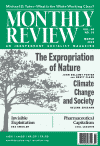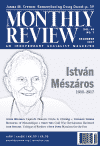United States

Forthcoming in March 2018
“I’ve still got my health so what do I care?” goes a lyric in an old Cole Porter song. Most of us, in fact, assume we can’t live full lives, or take on life’s challenges, without also assuming that we’re basically healthy and will be for the foreseeable future. But these days, our health and well-being are sorted through an ever-expanding, profit-seeking financial complex that monitors, controls, and commodifies our very existence. Given that our access to competent, affordable health care grows more precarious each day, the arrival of Health Care Under the Knife could not be more timely. In this empowering book, noted health-care professionals, scholars, and activists—including coordinator Howard Waitzkin—impart their inside knowledge of the medical system: what’s wrong, how it got this way, and what we can do to heal it. | more…

Nuclear weapons have been used again and again—most often by the United States—as threats directed at various nation-states to achieve geopolitical ends. Each such use takes us closer to the precipice of all-out nuclear war. | more…

In his timely new book, David Gilbert addresses a subject that could not be more relevant: the white working class in the United States. He brings a much-needed historical perspective to current debates around the politics and identity of white workers, then and now. | more…

A recent article by the economist Riccardo Bellofiore includes a significant treatment of Paul Sweezy’s dynamic theory of monopoly capital. But the essay’s most noteworthy contributions, in our view, relate to Harry Magdoff and Sweezy’s role in the 1970s and ’80s in developing a theory of financialization, and what their analysis can tell us about our current situation. | more…

The most important principle of the monopoly capital tradition is that of “the present as history”—a focus on the historical specificity that separates the various modes, stages, and phases of production and accumulation, and its application to our understanding of the present. | more…

The United States was founded as an empire on conquered land, and firearms manufacturing was one of the country’s first successful modern industries. Gun proliferation and gun violence today are among its legacies. | more…

The Criminalization of Indigenous Resistance
Indigenous peoples of the Americas are on the frontlines of resistance to the environmental and social costs of the unthinking drive for capital accumulation. From the United States and Canada to Brazil and Chile, that resistance has been met by state surveillance, repression, and criminalization. | more…

In Manufacturing Consent (1988), Noam Chomsky and I put forward a “propaganda model” as a framework for understanding how and why the mainstream U.S. media operate within restricted assumptions, depend uncritically on elite sources, and participate in propaganda campaigns helpful to elite interests. In this article I describe the model, address some of the criticism leveled against it, and discuss how it holds up today. | more…

“Monopoly capital” is a term for the new form of capital, embodied in the modern giant corporation, that in the late nineteenth century began to displace the small family firm as the dominant economic unit, marking the end of the freely competitive stage of capitalism. | more…

István Mészáros, who died on October 1 at the age of eighty-six, was a leading Marxist theorist and a frequent contributor to MR. No political philosopher of our age has reached nearly so far in joining philosophy with political-economic critique, or in systematically addressing the question of the movement toward socialism. | more…

The Radical Historians of U.S. Empire
In the early years of the Cold War, the academic study of international relations was an ideological tool serving the foreign policy of the United States and its allies. But in the 1960s, a new generation of scholars began to challenge the reigning orthodoxy. | more…

Longtime readers of Monthly Review would likely agree that the world is a colder, darker place without Doug Dowd, economist, activist, writer, teacher, and friend. He was a rock-bottom radical, a measure of the very best in the human soul. | more…











